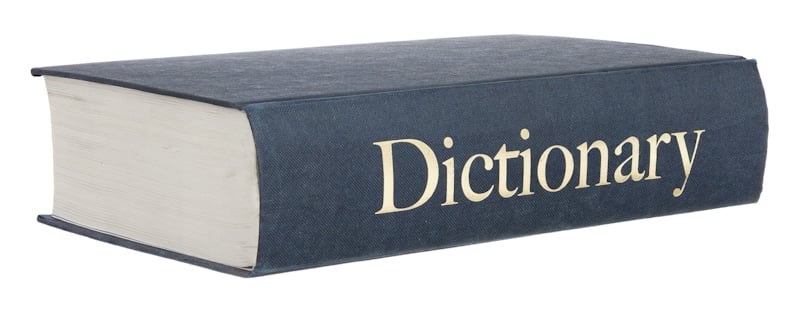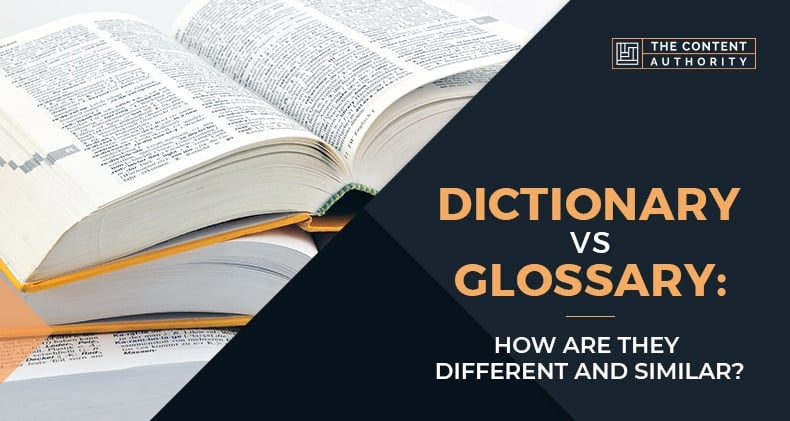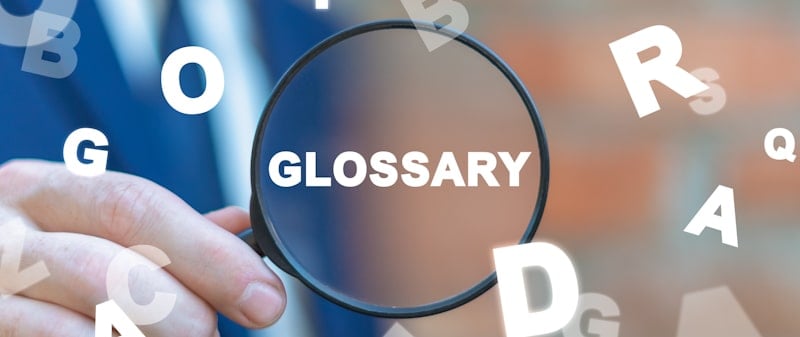It is very easy to be confused when you see two words that have similar meanings. You could easily misuse one for the other, and this always ends up in poor communication skills. One of such cases is “dictionary” and “glossary.”
“Dictionary” refers to a large compilation of different words, meaning, synonyms, antonyms, and language usage. “Glossary,” on the other hand, is an alphabetical list of words or a type of dictionary that is specific to a particular chapter of a book or a lesson.
You can see that there are some similarities between both words. However, for better clarity, let us look at how they are similar and different. Relax, and enjoy your read.
Origin Of The Word “Dictionary”
The word “dictionary” is from the early 16th century. It originated from the medieval Latin word “dictionarium,” which means a collection of words and phrases from the Latin word “dictionarius,” which means ‘of words.’ These words come from the Latin word “diction.”
The Medieval Latin word “dictionarium” was first used as the title of a Latin vocabulary written by John of Garland in 1220. The first use of the English word “dictionary” was in 1538. It was the title of a book written by Sir Elyot Thomas.
The word “dictionary” was created by John Of Garland, an Englishman, in a book titled “dictionarius” in 1220 to help with Latin diction. In 1582, Mulcaster Richard created an early non-alphabetical list of English words.

Later in 1604, an English school teacher, Cawdrey Robert, wrote the first purely English alphabetical dictionary, which he sold out quickly. Presently, only one copy of the book can be found at Bodleian Library in Oxford.
In 1755, Johnson Samuel wrote and published the first reliable English dictionary (the first modern dictionary). The dictionary was arranged alphabetically and contained textual references for all the words in it.
Johnson Samuel was the English language standard for over 150 years until Oxford University began writing and publishing the Oxford English Dictionary in 1884. The printing of the dictionary took nearly fifty years to be complete, and they released the dictionary in 1928.
After the Oxford dictionary was released, others started writing their dictionaries. In 1806, Webster Noah published his dictionary. A year later, he began expanding and compiling new things to add to the dictionary. It took him twenty-seven years to finish it.
Webster Noah completed his dictionary in Paris at the University of Cambridge in 1825. After the publishing of the dictionary in 1828, 2500 copies were sold. In 1840, G&C Merriam acquired the dictionary, and it was named the Merriam-Webster Dictionary.
When And How To Use The Word “Dictionary” In A Sentence
The word “dictionary” refers to a manual or electronic book where you can get the meaning of any word, its origin, synonyms, antonyms, and the part of speech it belongs to.
You can also refer to a “dictionary” as a source of reference to the definition or meaning of words, their uses, and pronunciation. “Dictionaries” can be in print and digital forms. There are different types of dictionaries in the world today. Every year, different “dictionaries” are being updated worldwide, and new words are added to the dictionary.
The “dictionary” is a book containing all the principal words of a language arranged in a stated order, usually in alphabetical order, explaining their meanings and other information about the words.
Examples Of The Usage Of The Word “Dictionary”
- My little sister kept nagging me to tell her the meaning of photosynthesis, so I told her to go and check the dictionary for its meaning.
- There was a dictionary on the list of books I needed for my new class. So, I went to the store to purchase a new one as my old dictionary was torn.
- I have always been fascinated by the writers and publishers of dictionaries because they would exert time, energy, and resources in finding a simplified way to define words.
- The bookshelf in my room is filled with different dictionaries and some of my textbooks.
- “One of the best ways to improve your vocabulary is by studying the dictionary.” The English tutor told the students in fourth grade.
Origin Of The Word “Glossary”
The word “glossary” has its origin from the Middle English word “glosarie” or “glossarye,” which was borrowed from the Medieval Latin word “glossarium,” which means ‘collection of glosses.’
The Latin word “glossarium” was coined out from the Greek word “glossarion,” which is the root word of “glossa,” which means ‘obsolete or foreign word.’ The word “glossary” was first used in the 14th century.
When And How To Use The Word “Glossary” In A Sentence
The word “glossary” refers to a list of words and meanings usually in an alphabetical order related to a specific topic, chapter, subject, or field.
“Glossary” can also mean the words on a diagram or map that explains the symbols used. So a “glossary” is not only a list of words but also symbols. It is also a set of rules used for forming the terms or names in a particular field.
You use the word “glossary” when referring to a list containing the meaning of words used frequently in a book. It is usually found at the back of a book. So, after reading a book, the list at the end that explains some of the words used in the book is referred to as a “glossary.”
Examples Of The Usage Of The Word “Glossary”
- James was writing a new book for children, so I told him to add a glossary so that the kids who read it can understand what some of the words meant.
- The glossary in the treasure map helped us during the treasure hunt, and we were able to find the treasure before the other groups.
- At the back of the cooking book, a glossary explained some of the cooking terms so that we could cook the perfect meal.
- The book I was reading did not have a glossary, so I had a dictionary with me the whole time to look up some unfamiliar words.
- It always helps when a book has a glossary. It encourages people to read more because they can easily check the meaning of unfamiliar words.
Similarities Between “Dictionary” And “Glossary”
The two words “dictionary” and “glossary,” although they are different, have some similarities. One of the main similarities between the two is that they are both a list of words.
Another similarity is that they both provide meaning to the words they contain. Sometimes, a glossary can refer to a dictionary containing a particular set of words and their meaning.
Differences Between “Dictionary” And “Glossary”
A “dictionary” is a large compilation of different words and their meaning alphabetically. In contrast, a “glossary” is a list of words that appears in a particular chapter of a book or a lesson.
“Glossary” is a word list that facilitates understanding the meaning of some words used in a book. “Dictionary,” on the other hand, is a collection of a large number of words and their meaning, so it is broader than a “glossary.”
These similarities and differences will help you understand the two words better, so you know which to use and when to use them in a sentence.
Final Thoughts
The English language is not without its complications. Every language is complicated to a person who is unfamiliar with basic knowledge. However, a comprehensive study helps clarify and simplify the language.
If you have always been confused with the words “dictionary” and “glossary,” study this blog post, and you would have better clarity of the similarities and differences between both words. So, take your time to study.
Shawn Manaher is the founder and CEO of The Content Authority. He’s one part content manager, one part writing ninja organizer, and two parts leader of top content creators. You don’t even want to know what he calls pancakes.


